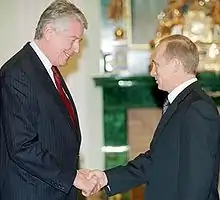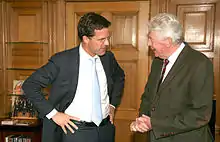Wim Kok
Willem "Wim" Kok (Dutch pronunciation: [ˈʋɪm ˈkɔk] (![]() listen); 29 September 1938 – 20 October 2018) was a Dutch politician of the Labour Party (PvdA) and trade union leader who served as Prime Minister of the Netherlands from 22 August 1994 until 22 July 2002.[1][2]
listen); 29 September 1938 – 20 October 2018) was a Dutch politician of the Labour Party (PvdA) and trade union leader who served as Prime Minister of the Netherlands from 22 August 1994 until 22 July 2002.[1][2]
Wim Kok | |
|---|---|
 Wim Kok in 1994 | |
| Prime Minister of the Netherlands | |
| In office 22 August 1994 – 22 July 2002 | |
| Monarch | Beatrix |
| Deputy | See list
|
| Preceded by | Ruud Lubbers |
| Succeeded by | Jan Peter Balkenende |
| Deputy Prime Minister | |
| In office 7 November 1989 – 22 August 1994 | |
| Prime Minister | Ruud Lubbers |
| Preceded by | Rudolf de Korte |
| Succeeded by | Hans Dijkstal Hans van Mierlo |
| Minister of Finance | |
| In office 7 November 1989 – 22 August 1994 | |
| Prime Minister | Ruud Lubbers |
| Preceded by | Onno Ruding |
| Succeeded by | Gerrit Zalm |
| Leader of the Labour Party | |
| In office 21 July 1986 – 15 December 2001 | |
| Deputy | Wim Meijer Thijs Wöltgens Jacques Wallage Ad Melkert |
| Preceded by | Joop den Uyl |
| Succeeded by | Ad Melkert |
| Leader of the Labour Party in the House of Representatives | |
| In office 19 May 1998 – 30 May 1998 | |
| Preceded by | Jacques Wallage |
| Succeeded by | Jacques Wallage |
| In office 17 May 1994 – 22 August 1994 | |
| Preceded by | Thijs Wöltgens |
| Succeeded by | Jacques Wallage |
| In office 21 July 1986 – 5 November 1989 | |
| Preceded by | Joop den Uyl |
| Succeeded by | Thijs Wöltgens |
| Member of the House of Representatives | |
| In office 19 May 1998 – 22 August 1998 | |
| In office 17 May 1994 – 22 August 1994 | |
| In office 3 June 1986 – 7 November 1989 | |
| Personal details | |
| Born | Willem Kok 29 September 1938 Bergambacht, Netherlands |
| Died | 20 October 2018 (aged 80) Amsterdam, Netherlands |
| Nationality | Dutch |
| Political party | Labour Party (from 1961) |
| Alma mater | Nyenrode Business School (BBA) |
| Occupation |
|
| Signature |  |
| Military service | |
| Allegiance | |
| Branch/service | |
| Years of service | 1958–1959 (Conscription) 1959–1961 (Reserve |
| Rank | |
Kok studied business administration at the Nyenrode Business School obtaining a Bachelor of Business Administration degree and worked as a trade union leader for the Trade Unions Association from 1961 until 1976 and serving as chairman from 1972. In 1976 it merged to form the Federation of Dutch Trade Unions, with Kok serving as its first chairman until 1986. After the election of 1986, Kok was elected as a Member of the House of Representatives, taking office on 3 June 1986. Shortly after the election incumbent Leader Joop den Uyl announced he was stepping down and endorsed Kok as his successor taking office on 21 July 1986. For the election of 1989, Kok served as Lijsttrekker (top candidate) and made a coalition accord with incumbent Prime Minister Ruud Lubbers of the Christian Democratic Appeal (CDA) which formed the Cabinet Lubbers III and became Deputy Prime Minister and Minister of Finance taking office on 7 November 1989.
For the election of 1994 Kok again served as Lijsttrekker and following a cabinet formation, formed the Cabinet Kok I and became Prime Minister of the Netherlands taking office on 22 August 1994. For the election of 1998 Kok once more served as Lijsttrekker and after another successful cabinet formation, formed the Cabinet Kok II and continued as Prime Minister for a second term. In December 2001 Kok announced he was stepping down as Leader and that he wouldn't stand for the election of 2002 or serve another term as Prime Minister. Kok left office following the installation of the Cabinet Balkenende I on 22 July 2002.
Kok retired from active politics at 63 and became active in the private and public sectors as a corporate and non-profit director, served on several state commissions and councils on behalf of the government, and continued to be active as a lobbyist for the European Union, advocating for more European integration. Kok was known for his abilities as a manager and negotiator. During his premiership, his cabinets were responsible for several major social reforms legalizing same-sex marriage, euthanasia and further reducing the deficit. Kok was granted the honourary title of Minister of State on 11 April 2003 and continued to comment on political affairs as a statesman until his death at the age of 80. He holds the distinction of leading the first purple coalitions as Prime Minister and is consistently ranked both by scholars and the public as one of the best Prime Ministers after World War II.[2][3][4][5]
Early life
Willem Kok was born on 29 September 1938, in Bergambacht in the Netherlands Province of South Holland, the son of Willem Kok (29 March 1910 – 10 January 1981) a carpenter, and Neeltje de Jager (17 October 1913 – 5 May 2005).[6] He had one younger brother, who was born in 1945.[7]
After completing his studies in business at the Nyenrode Business Universiteit, he started his career in 1961 at the socialist Netherlands Association of Trade Unions (NVV), where he was chairman from 1973 until 1982. In 1982, the NVV merged with Nederlands Katholiek Vakverbond (NKV), the Catholic trade union, to form the Federatie Nederlandse Vakbeweging (FNV), of which he served as chair until 1986.[8]
Political career
Parliamentary leader and Minister of Finance



Kok was elected as a Member of the House of Representatives on 3 June 1986, after the Dutch general election of 1986. Soon after the election Joop den Uyl the Leader of the Labour Party and Parliamentary leader of the Labour Party in the House of Representatives announced that he was stepping down after serving twenty years as Leader of the Labour Party. Kok was elected to succeed him and became Party and Parliamentary leader of the Labour Party in the House of Representatives on 21 July 1986 and served as Opposition leader during the parliamentary period of the Cabinet Lubbers II.[9]
Kok lead his party in the Dutch general election of 1989. The Labour Party lost three seats but the following cabinet formation resulted in a coalition agreement with the Christian Democratic Appeal (CDA) which formed the Cabinet Lubbers III. Kok entered government for the first time and became both Deputy Prime Minister of the Netherlands and Minister of Finance, serving from 7 November 1989 until 22 August 1994.[10]
First term (1994–1998)
In the 1994 general election, the Labour Party lost twelve seats but the CDA with new leader Elco Brinkman lost twenty seats. The Labour Party became the largest party in the House of Representatives, after an arduous cabinet formation with the conservative liberal People's Party for Freedom and Democracy (VVD) and the social liberal Democrats 66 (D66) a deal was struck that resulted in the Cabinet Kok I, with Kok as Prime Minister. It was considered groundbreaking in Dutch politics this was the first Cabinet of the Netherlands since 1908 without a Christian democratic party.[9]
The main aim of the Cabinet Kok I was to create employment. The Dutch economy had been in a deep recession for years. The market was allowed more influence in the economy. This led to a policy of tax reduction, economizing, and trying to keep people out of social care by supporting employment; large infrastructure projects were set in motion. Another aim was to put an end to the enormous debt of the Dutch government.[9] The Treaty of Amsterdam was signed during this cabinet. The Srebrenica massacre occurred under the responsibility of this government, which eventually led to the fall of the second Kok cabinet.
In the 1998 general election, the Labour party gained eight seats; the coalition retained its majority, and cabinet formation resulted in a continuation of policies with the Cabinet Kok II.
Second term (1998–2002)
The second cabinet was the successor of the first cabinet was formed from the same coalition of PvdA, VVD and D66. It was also known as the "second purple cabinet" called such because it contained both the social-democratic PvdA (red) and the liberal VVD (blue). The aim of the cabinet was to continue the policy of cabinet Kok I, which was concerned with economizing, tax reduction, and making an end to unemployment. Kok was the prime minister, Annemarie Jorritsma as the deputy prime minister for the VVD, and Els Borst for D66. The cabinet had both left-wing and right-wing political parties as a part of it. There was no strong opposition in the House of Representatives. This did not mean that Kok did not face any problems. In May 1999, D66 stepped out of the coalition when proposed legislation on referenda, entered by this party, was blocked; through negotiations the crisis was solved and the cabinet stayed together. Moreover, allegations of expenses abuse were made against Minister of the Interior and Kingdom Relations Bram Peper from the time he was mayor of Rotterdam. On 13 March 2000 Peper resigned as minister, according to himself to no longer bring problems to the public government, and to be better able to defend himself.[11] On the other hand, Kok's second term is known for legalizing same-sex marriage and euthanasia.[9]
On 15 December 2001, Kok announced he would retire from national politics after the elections of May 2002. He stood down as Leader of the Labour Party that same day, in favour of Ad Melkert. Unfortunately, Melkert did not appeal to the voter. Moreover, the "polder model" went out of fashion in early 2002, which saw the rise of Pim Fortuyn, a political newcomer.
On 16 April 2002, close to the natural end of term for the cabinet, prime minister Kok wished to resign early after being harshly criticised in a government-commissioned report by the NIOD Institute for War, Holocaust and Genocide Studies regarding the fall of Srebrenica in 1995[12] and the other ministers had no choice but to follow him. The second Kok cabinet remained in place as a caretaker cabinet, which had to cope with the murder of Fortuyn, and the CDA with leader Jan Peter Balkenende winning the elections. The caretaker cabinet stepped down on 22 July 2002, when the Cabinet Balkenende I was installed.[2]
Legacy
Kok was highly praised for his Third Way and polder model philosophies and for the success of leading his Purple Coalitions. During his premiership, his cabinets were responsible for implementing several social reforms, legalizing same-sex marriage and euthanasia,[12] stimulating the economy resulting in more employment and privatization and further reducing the deficit. As a result of this, and because of his skills as manager and negotiator, Kok was praised by his fellow European leaders.[12]
After politics
After his premiership, Kok retired from active politics at the age of sixty-three and became a lobbyist for the European Union and presided over several "high-level groups". He also occupied numerous seats on supervisory boards in the business and industry world (ING Group, Koninklijke TNT Post, Royal Dutch Shell, KLM, Stork B.V., International Commission on Missing Persons, International Crisis Group, Anne Frank Foundation and served as president of the Club of Madrid from 2009 until December 2013).[13] On 11 April 2003, he was granted the honorary title of Minister of State.[14]
Lisbon Strategy
Between April and November 2004, Kok headed up a review of the Lisbon Strategy and presented a report containing suggestions on how to give new impetus to the Lisbon process.[15] The European Commission used this report to declare that the social and environmental parts are no longer a priority and declared a return to the Lisbon Agenda under economic terms only. Kok lobbied for the Lisbon Strategy of the European Commission and was appointed to the Honorary Board of the European Association of History Educators.[16]
Between 2006 and 2007, Kok served as member of the Amato Group, a group of high-level European politicians unofficially working on rewriting the Treaty establishing a Constitution for Europe into what became known as the Treaty of Lisbon following its rejection by French and Dutch voters.[17]
Personal
In 1965, after four years of dating, Kok married Margrietha "Rita" Roukema (born 3 November 1939).[18] He adopted her two children from a previous marriage, daughter Carla (born 1959) and son André (born 1961), who is mentally and physically disabled, and together they had a third child, son Marcel (born 1966).[19]
Death
Kok died on 20 October 2018 in Amsterdam, aged 80.[20]
Decorations
| Honours | ||||
| Ribbon bar | Honour | Country | Date | Comment |
|---|---|---|---|---|
| Knight Grand Cross of the Order of Isabella the Catholic | Spain | 19 October 2001 | [21] | |
| Knight Grand Cross of the Order of Orange-Nassau | Netherlands | 10 December 2002 | [22] | |
| Commander Grand Cross of the Order of the Three Stars | Latvia | 15 November 2004 | ||
| Honorific Titles | ||||
| Ribbon bar | Honour | Country | Date | Comment |
| Minister of State | Netherlands | 11 April 2003 | Style of Excellency | |
Honorary degrees
| Honorary degrees | ||||
| University | Field | Country | Date | Comment |
|---|---|---|---|---|
| Nyenrode Business University | Public administration | Netherlands | 2 September 2003 | |
| University of Münster | Philosophy | Germany | 2003 | |
References
- (in Dutch) Wim Kok (1938) Biografie, Absolutefacts.nl, 4 June 2010.
- (in Dutch) Wim Kok: bezuiniger tegen wil en dank Archived 27 October 2012 at the Wayback Machine, Elsevier, 29 March 2012.
- (in Dutch) Willem Drees gekozen tot ‘Dé premier na WO II’, Geschiedenis24.nl, 15 January 2006
- (in Dutch) NRC-enquête: Drees en Lubbers beste premiers sinds 1900, NRC Handelsblad, 28 September 2013
- (in Dutch) I&O Research, I&O Research, 13 March 2020
- www.online-familieberichten.nl
- Willem Kok, Geni.com, 24 February 2015
- "ICMP Willem (Wim) Kok, former Prime Minister of The Netherlands". International Commission on Missing Persons. Retrieved 22 October 2018.
- Vat, Dan van der (22 October 2018). "Wim Kok obituary". The Guardian. Retrieved 22 October 2018.
- Corder, Mike (20 October 2018). "Former Dutch PM Wim Kok dies at 80, haunted by Srebrenica". Washington Post.
- Interview with Bram Peper in Vrij Nederland, 12 July 2003 (Dutch)
- Former Dutch prime minister Wim Kok dies; Euronews; 21 October 2018
- (in Dutch) Wim Kok voorzitter Club van Madrid, Telegraaf, 13 November 2009
- (in Dutch) Dr. W. Kok Archived 15 September 2012 at the Wayback Machine, Rijksoverheid, 11 April 2003
- "Kok review of Lisbon strategy: excellent on diagnosis, weak on remedies". euractiv.com. 3 November 2004.
- "Honorary board – EUROCLIO – European Association of History Educators". EUROCLIO – European Association of History Educators. Retrieved 22 October 2018.
- "The way forward for the European Union" (PDF). Action Committee for European Democracy. Archived from the original (PDF) on 8 July 2007. Retrieved 8 July 2007.
- Chorus, Jutta (17 April 2004). "Het harnas van Rita Kok". NRC Handelsblad (in Dutch). Retrieved 20 October 2018.
- (in Dutch) 'Ik zou graag opa willen worden, dat lijkt me een mooie tijdsbesteding' Archived 3 December 2013 at the Wayback Machine, Opzij.nl, 1 December 1997
- "Oud-premier Wim Kok (80) overleden" (in Dutch). NOS.nl. 20 October 2018. Retrieved 20 October 2018.
- (in Spanish) REAL DECRETO 1143/2001 – Boletín Oficial del Estado
- Gedwongen huwelijken, HP De Tijd, 29 January 2010, by Bas Paternotte
External links
| Wikiquote has quotations related to: Wim Kok |
| Wikimedia Commons has media related to Wim Kok. |
- Official
- (in Dutch) W. (Wim) Kok Parlement & Politiek
- (in Dutch) Kabinet-Kok I Rijksoverheid
- (in Dutch) Kabinet-Kok II Rijksoverheid
- Other
| Party political offices | ||
|---|---|---|
| Preceded by Joop den Uyl |
Leader of the Labour Party 1986–2001 |
Succeeded by Ad Melkert |
| Leader of the Labour Party in the House of Representatives 1986–1989 |
Succeeded by Thijs Wöltgens | |
| Preceded by Thijs Wöltgens |
Leader of the Labour Party in the House of Representatives 1994 |
Succeeded by Jacques Wallage |
| Preceded by Jacques Wallage |
Leader of the Labour Party in the House of Representatives 1998 | |
| Political offices | ||
| Preceded by Rudolf de Korte |
Deputy Prime Minister of the Netherlands 1989–1994 |
Succeeded by Hans Dijkstal as First Deputy Prime Minister of the Netherlands |
| Preceded by Onno Ruding |
Minister of Finance 1989–1994 |
Succeeded by Gerrit Zalm |
| Preceded by Ruud Lubbers |
Prime Minister of the Netherlands 1994–2002 |
Succeeded by Jan Peter Balkenende |
| Minister of General Affairs 1994–2002 | ||
| Preceded by John Bruton |
President of the European Council 1997 |
Succeeded by Jean-Claude Juncker |
| Trade union offices | ||
| Preceded by Heinz Oskar Vetter |
President of the European Trade Union Confederation 1979–1982 |
Succeeded by Georges Debunne |
| Non-profit organization positions | ||
| Preceded by Johan Stekelenburg |
Chairman of the Anne Frank Foundation 2004–2016 |
Succeeded by Ernst Hirsch Ballin |
| Preceded by Ricardo Lagos |
President of the Club of Madrid 2009–2014 |
Succeeded by Vaira Vīķe-Freiberga |
